

Action research. Contents: introduction · origins · the decline and rediscovery of action research · conclusion · further reading · how to cite this article. see, also: research for practice.
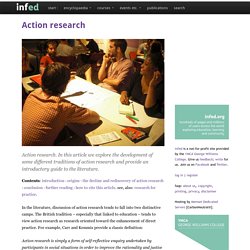
In the literature, discussion of action research tends to fall into two distinctive camps. The British tradition – especially that linked to education – tends to view action research as research oriented toward the enhancement of direct practice. For example, Carr and Kemmis provide a classic definition: Action research is simply a form of self-reflective enquiry undertaken by participants in social situations in order to improve the rationality and justice of their own practices, their understanding of these practices, and the situations in which the practices are carried out (Carr and Kemmis 1986: 162). Many people are drawn to this understanding of action research because it is firmly located in the realm of the practitioner – it is tied to self-reflection.
Origins This is how Lewin describes the initial cycle: Beginners' guide to action research. A beginner's guide to action research 1 This is a resource file which supports the regular public program "areol" (action research and evaluation on line) offered twice a year beginning in mid-February and mid-July.
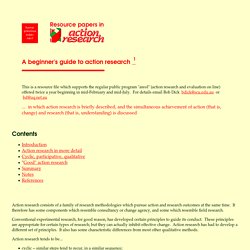
For details email Bob Dick bdick@scu.edu.au or bd@uq.net.au ... in which action research is briefly described, and the simultaneous achievement of action (that is, change) and research (that is, understanding) is discussed Contents Action research consists of a family of research methodologies which pursue action and research outcomes at the same time.
It therefore has some components which resemble consultancy or change agency, and some which resemble field research. Conventional experimental research, for good reason, has developed certain principles to guide its conduct. These principles are appropriate for certain types of research; but they can actually inhibit effective change. Plan --> act --> observe --> reflect (and then --> plan etc.) Tion Research in Education. Search RESINED Home Beginning Research | Action Research | Case Study | Interviews | Observation Techniques | Education Research in the Postmodern Evaluation Research in Education | Narrative| Presentations | Qualitative Research | Quantitative Methods | Questionnaires | Writing up Research Action Research in Education Currently overseen by Maureen McGinty Originally prepared by Dr Stephen Waters-Adams © S Waters-Adams, Faculty of Education, University of Plymouth, 2006 Part One: Introduction.
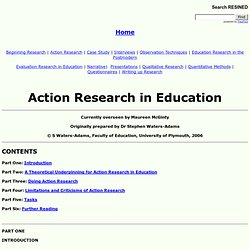
ACTION RESEARCH IN WORKPLACE EDUCATION - A Handbook for Literacy Instructors - Table of Contents. Overview of Action Research Methodology. “If you want it done right, you may as well do it yourself.”
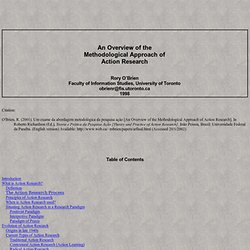
This aphorism may seem appropriate if you are a picky housekeeper, but more and more people are beginning to realize it can also apply to large corporations, community development projects, and even national governments. Such entities exist increasingly in an interdependent world, and are relying on Action Research as a means of coming to grips with their constantly changing and turbulent environments. This paper will answer the question “What is Action Research?” , giving an overview of its processes and principles, stating when it is appropriate to use, and situating it within a praxis research paradigm. The evolution of the approach will be described, including the various kinds of action research being used today. Definition "Action research...aims to contribute both to the practical concerns of people in an immediate problematic situation and to further the goals of social science simultaneously.
Center for Collaborative Action Research- Action Research with technology, Pepperdine University. An Introduction to Action Research. I feel that we need to make a greater effort to involve teachers in Action Research.
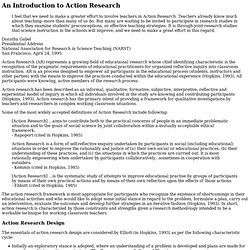
Teachers already know much about teaching--more than many of us do. But many are waiting to be invited to participate in research studies in which they examine students' preconceptions, or effective teaching strategies. It is through joint research studies that science instruction in the schools will improve, and we need to make a great effort in this regard. Dorothy Gabel Presidential Address National Association for Research in Science Teaching (NARST) San Francisco, April 24, 1995 Action Research (AR) represents a growing field of educational research whose chief identifying characteristic is the recognition of the pragmatic requirements of educational practitioners for organized reflective inquiry into classroom instruction.